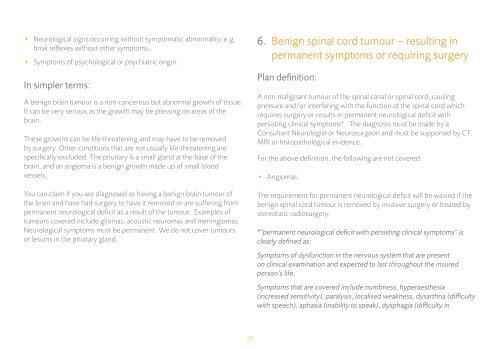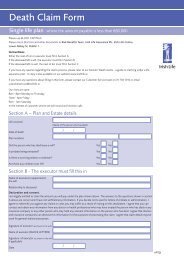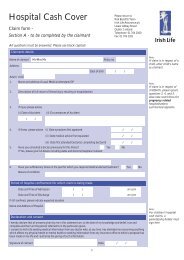Mortgage Protection booklet - Irish Life
Mortgage Protection booklet - Irish Life
Mortgage Protection booklet - Irish Life
Create successful ePaper yourself
Turn your PDF publications into a flip-book with our unique Google optimized e-Paper software.
• Neurological signs occurring without symptomatic abnormality, e.g.<br />
brisk reflexes without other symptoms.<br />
• Symptoms of psychological or psychiatric origin.<br />
In simpler terms:<br />
A benign brain tumour is a non-cancerous but abnormal growth of tissue.<br />
It can be very serious as the growth may be pressing on areas of the<br />
brain.<br />
These growths can be life-threatening and may have to be removed<br />
by surgery. Other conditions that are not usually life-threatening are<br />
specifically excluded. The pituitary is a small gland at the base of the<br />
brain, and an angioma is a benign growth made up of small blood<br />
vessels.<br />
You can claim if you are diagnosed as having a benign brain tumour of<br />
the brain and have had surgery to have it removed or are suffering from<br />
permanent neurological deficit as a result of the tumour. Examples of<br />
tumours covered include gliomas, acoustic neuromas and meningiomas.<br />
Neurological symptoms must be permanent. We do not cover tumours<br />
or lesions in the pituitary gland.<br />
28<br />
6. Benign spinal cord tumour – resulting in<br />
permanent symptoms or requiring surgery<br />
Plan definition:<br />
A non-malignant tumour of the spinal canal or spinal cord, causing<br />
pressure and/or interfering with the function of the spinal cord which<br />
requires surgery or results in permanent neurological deficit with<br />
persisting clinical symptoms*. The diagnosis must be made by a<br />
Consultant Neurologist or Neurosurgeon and must be supported by CT,<br />
MRI or histopathological evidence.<br />
For the above definition, the following are not covered:<br />
• Angiomas.<br />
The requirement for permanent neurological deficit will be waived if the<br />
benign spinal cord tumour is removed by invasive surgery or treated by<br />
stereotatic radiosurgery.<br />
*”permanent neurological deficit with persisting clinical symptoms” is<br />
clearly defined as:<br />
Symptoms of dysfunction in the nervous system that are present<br />
on clinical examination and expected to last throughout the insured<br />
person’s life.<br />
Symptoms that are covered include numbness, hyperaesthesia<br />
(increased sensitivity), paralysis, localised weakness, dysarthria (difficulty<br />
with speech), aphasia (inability to speak), dysphagia (difficulty in

















